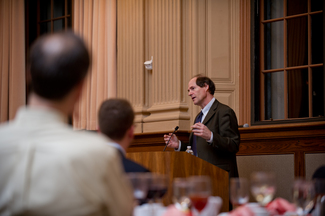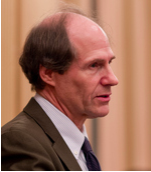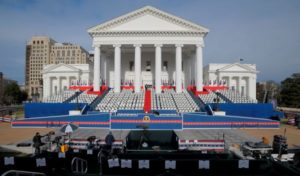
OIRA’s external meetings play an important role in rulemaking.
So far we have covered the internal process of the Office of Information and Regulatory Affairs (OIRA). There’s also OIRA’s external meetings, something that’s gotten a lot of attention in academic circles and which actually bears on political life generally. OIRA will meet with anyone who wants to come in and talk about a rule under review. One thing that I did was to rework our web site, RegInfo.gov. I’m sure some of you probably already go on it, but RegInfo.gov has all the rules under review, and it’s extremely clear. You can see it all at a glance. If anyone wants to come in and talk to OIRA about a rule under review, please do.
It just so happens that on environmental rules, the people who come in are well over half industry, and that environmental groups, on an environmental rule, are well under half. And there’s concern on the part of the progressive community that this practice of meeting with outside groups is a plea for, or a built-in invitation to, capitulation or capture by the people who come in. I didn’t really see that and I think it’s a baseless charge, but it can’t be ruled out in theory. There is a possible risk of what we might call epistemic capture. This is not like caving to political pressure—that doesn’t happen—but capture in the sense that government officials might develop rules the way they do because of the distinctive set of people with whom they’re talking. There’s a brilliant paper by a political scientist named Russell Hardin called “The Crippled Epistemology of Extremism,” and his claim is that extremists, such as terrorists, aren’t necessarily crazy or uneducated. It’s just that what they know is crippled; it’s based on what they hear. They’re not nuts or illiterate. It’s just that everything they hear supports and reinforces the view that they hold.
The reason I love Hardin’s paper so much is that it’s not just true of extremists; it’s true, in some sense, of all of us. What we know depends on the people we’re talking to, and it is possible that the federal government, if it’s talking to a certain sub-class of people, will have a crippled epistemology and will be subject to epistemic capture.
I don’t think this is an accurate portrayal of the OIRA process for a couple of reasons. The role of meetings in the OIRA process is not large. The review process relies, and I hope I’ve clarified this, on inter-agency comments and written comments from the public. It’s extremely rare that a meeting discloses material that isn’t already in the public comments. In fact, I went to a lot of meetings, and there wasn’t a single one where I heard something I hadn’t read before the meeting. I recently asked someone at OIRA who has been there a long time whether it ever happened that a meeting disclosed some information he didn’t already know. He said that it didn’t happen once.
A lot of the meetings—and I think this is relevant to any lawyers out there—have no effect at all because the presenters speak in vague and general terms and offer nothing new. Sometimes they offer the equivalent of boos and hisses, enthusiastic support or extreme skepticism, and that really is not helpful at all. I remember one meeting I had with a very impressive person in the progressive community—and I was there because the guy is a big deal in Washington, and I thought he’d have something useful to say—who said, “You know, it is very important that we do this.” And I said, “I know that. There are seven comments made by the people who are skeptical of the rule and who don’t want the rule to go forward in its proposed form. They have seven suggestions, and here they are. What do you think of them?” He didn’t know what I was talking about. I could have been speaking in Greek to him. That was a completely unhelpful meeting, and if we had 80 meetings with progressive groups like that, they wouldn’t have had any impact.
Industry was fully capable of those kinds of unhelpful meetings also. I remember one rule which was very, very controversial, and there were a bunch of meetings where industry came in and basically said, “This is just really bad and OIRA should write a return letter.” Those meetings had no impact because they didn’t have content.
This observation does not mean that meetings never matter. They could matter if they highlight information that’s in the comments already in a way that focuses people’s attention on a particular provision that might be improved. That type of meeting can be helpful, but they’re generally not a big deal or decisive.
This essay is the fourth of a five-part series drawing on Prof. Sunstein’s keynote address at the Penn Program on Regulation’s annual regulation dinner at the University of Pennsylvania Law School. Professor Sunstein’s lecture drew on an article that he subsequently published in the Harvard Law Review. His book, Simpler: The Future of Government, provides additional discussion of Sunstein’s accomplishments as OIRA Administrator.




